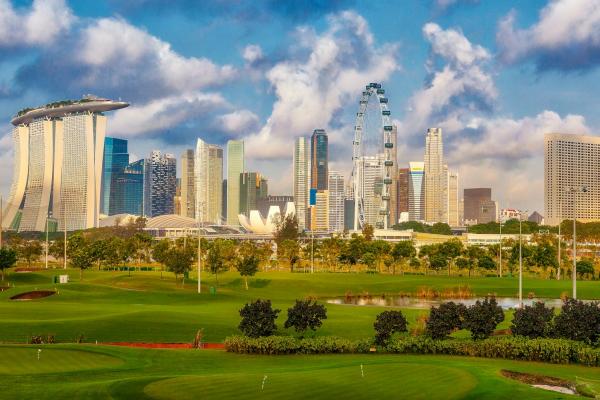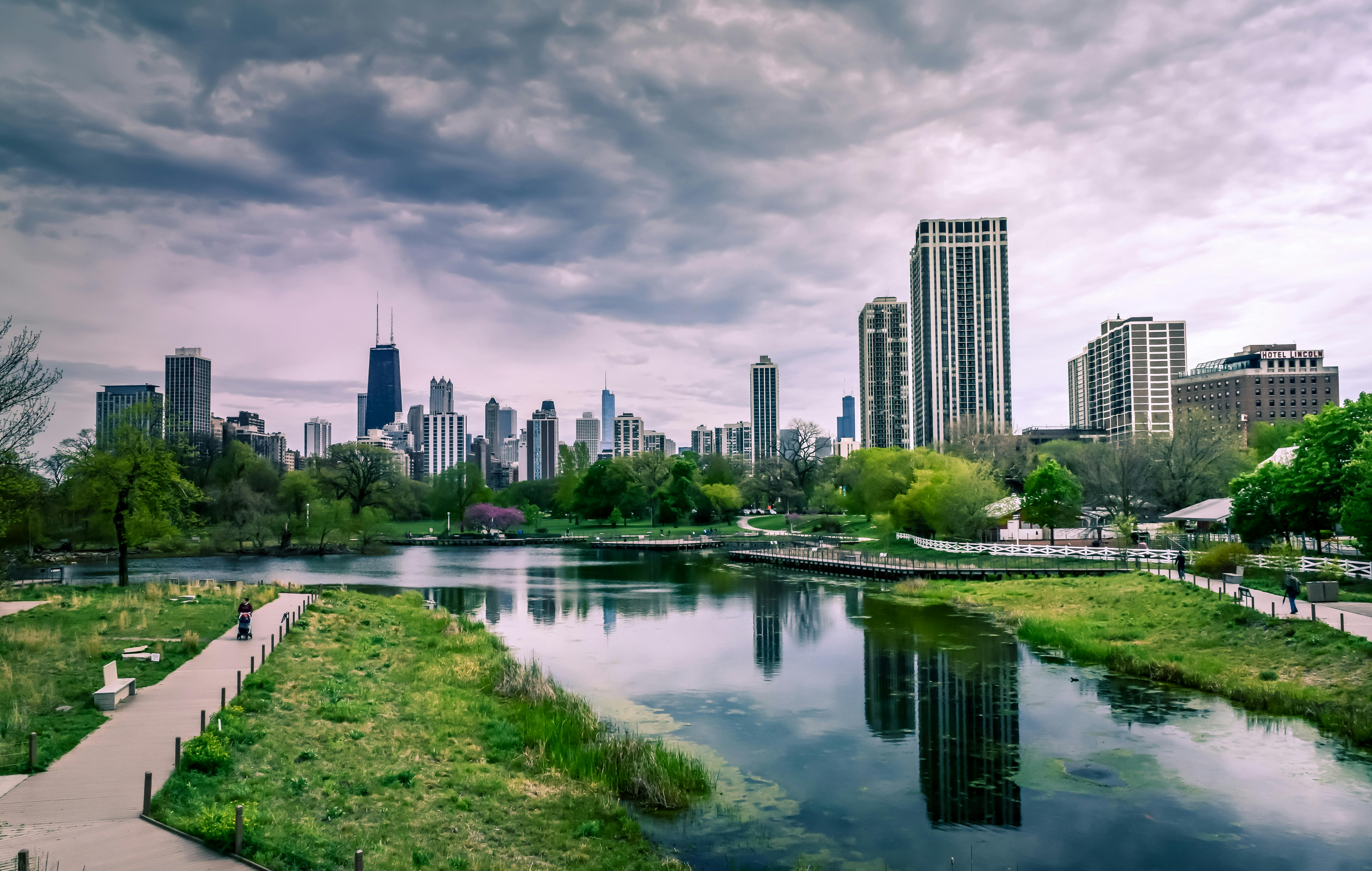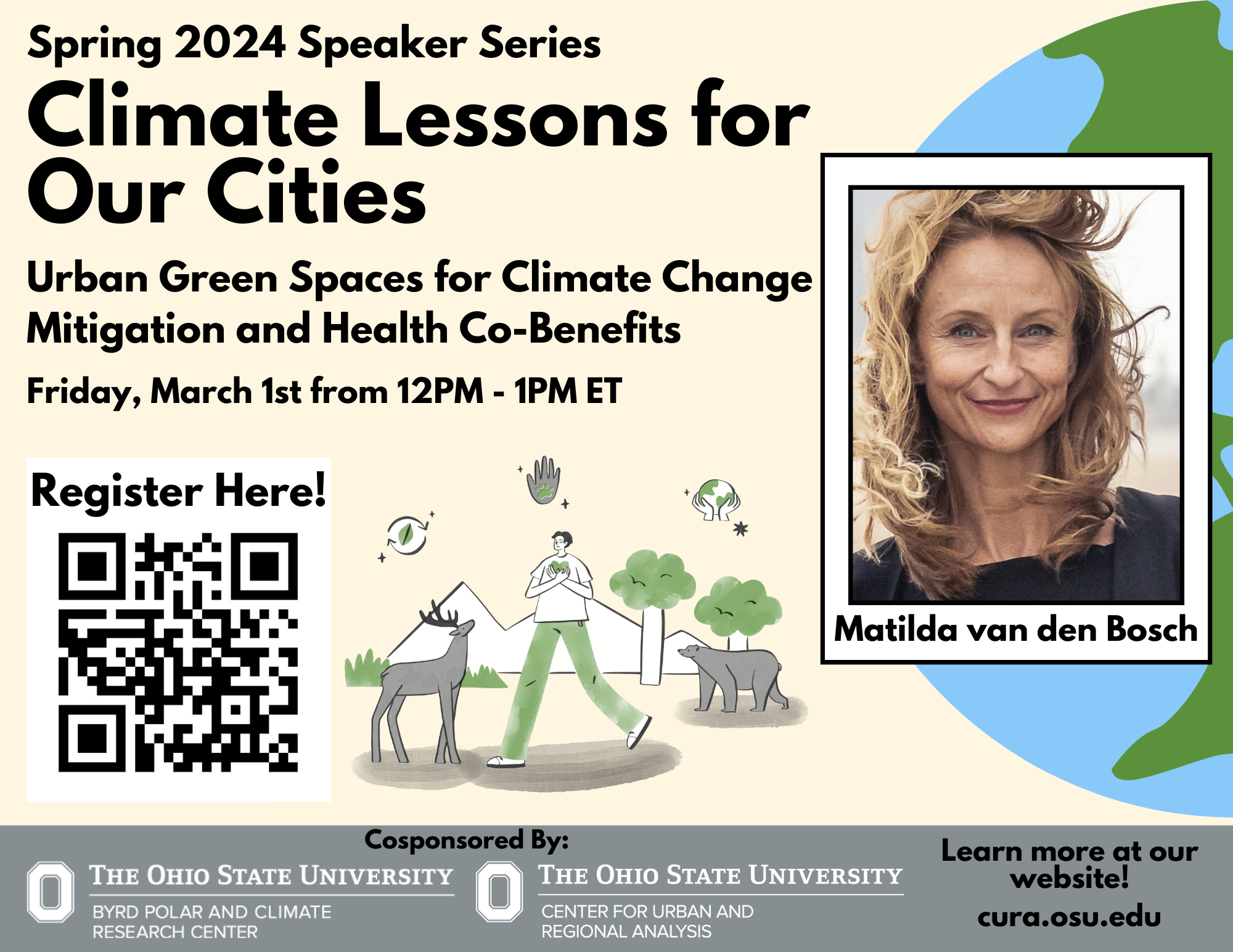Dr. Matilda van den Bosch Illuminates Urban Futures in Spring Speaker Series

On March 1, 2024, the Byrd Center, in collaboration with the Center for Urban and Regional Analysis, hosted Dr. Matilda van den Bosch (MD, PhD) as part of the Spring Speaker Series.
Dr. van den Bosch is a Senior Researcher at the Barcelona Institute for Global Health, Spain, and at the European Forest Institute Biocities Facility in Rome, Italy. She is also an adjunct professor at the University of British Columbia, Canada. She aims to contribute to evidence-based policies and practices that acknowledge and support the interdependence between a healthy planet and healthy people.
Being a physician, she is a pioneer in research on the beneficial impacts of nature on health, and she is the primary editor of the first textbook on the topic, published by the Oxford University Press. Dr. van den Bosch leads several international research projects related to climate change mitigation, childhood health, and nature-based solutions, and she advises various international organizations, including the World Health Organization (WHO) and the UN Environmental Programme.
In this virtual event, Dr. van den Bosch presented "Urban Green Spaces for Climate Change Mitigation and Health Co-Benefits," exploring the critical challenges and innovative solutions for creating sustainable and resilient cities in the face of rapid urbanization and climate change.
Dr. van den Bosch began by sharing some statistics from a study conducted at the Barcelona Institute for Global Health, published in 2021. The findings were that 43,000 deaths could be prevented each year in Europe if each resident has access to one hectare of green space within 300 meters of their home, based on the WHO recommendations.
In 2004, the World Health Organization (WHO) identified infectious diseases as the predominant concern in the Global Disease Scenario, dominating the global disease burden. However, by 2030, the WHO predicts a significant shift, with chronic lifestyle disorders, particularly mental illness, becoming the leading causes of disease. These disorders are closely linked to environmental factors. A recent study published in The Lancet highlights the increasing prevalence of obesity in lower-middle-income countries. The key risk factors contributing to these disease scenarios include stress, physical inactivity, loneliness, climate change, environmental pollution, and unplanned urbanization.
Dr. van den Bosch explained the model used in research for addressing how green space promotes human health through several pathways; At the top, the most important pathway is biodiversity. A healthy ecosystem is a biodiverse one that is needed in cities, too. Other pathways green spaces promote are physical activity, social contact, and stress reduction. The benefits of green cities outweigh the disadvantages, and humans depend on ecosystems.

Highlighting the pressing issues cities face worldwide, such as rising temperatures, Urban Heat Islands UHIs), increased pollution, and the growing demand for resources, she emphasized the importance of adopting a holistic approach to urban planning that integrates environmental, social, and economic factors.
Dr. van den Bosch presented a series of case studies about implementing adaptive, sustainable practices. According to one study, introducing urban parks reduces temperatures with a cooling intensity of 0.3-6.7°C. Another study shows that increasing tree cover in cities by 30% can reduce the temperatures of urban environments by 1.3°C and prevent one-third of premature deaths attributed to UHIs in the summer, around 2500 lives.
Meanwhile, she emphasized that mitigation is also crucial, discussing the co-benefits of forest-based climate change mitigation as trees act as carbon sinks, with ecosystem services as a core concept.
One of the key takeaways from Dr. van den Bosch's lecture was the lack of science communication. She noted that the relationship between science, policy, and practice needs more communication. According to a study by Posner et al. published in 2016, scientific knowledge about Ecosystem Services has a limited impact on policy and decisions.
Cognitive bias is one reason scientific knowledge is not part of the normative agenda, as there is a tendency towards "Quick fix" technological solutions vs. nature. In effect, nature is not seen as a solution. Another reason is the different language and terminologies used and the separation of academia and politicians. There is also an unbalanced message as children are detached from nature but are attached to the screen in a sedentary manner. Another reason is the unbalanced messages of "ecosystem disservices" like allergenic pollen, vector-borne diseases, and falling branches. Finally, competing interests also affect communication as economic crises, densification, and commercial investments compete for budgets for green infrastructure and green spaces.
Nature-based solutions address societal challenges through ecosystem protection, sustainable management, and restoration. This approach benefits biodiversity and human well-being by targeting climate change, disaster risk reduction, food and water security, biodiversity loss, and human health, all of which are critical to sustainable development.
Dr. van den Bosch shared examples of nature-based solutions worldwide and introduced the 3-30-300 rule for nature-based solutions for planners: 3 trees from your window, 30% tree cover, and 300 meters to the nearest park. She concluded by introducing Resonate, a project funded by the European Union's Horizons Europe Research and Innovation programme and co-funded by the UK Research and Innovation Grant, building individual and community resilience through nature-based therapies in and outside of cities to promote health and prevent disease and disorders with long term impact on the environment and society.
The Spring Speaker Series continues to serve as a platform for leading thinkers and practitioners to share their insights and inspire action towards a more sustainable and equitable world.
Watch the webinar recording by visiting our Vimeo page or click on the image below.

